The Boarders: Bloomington Blues
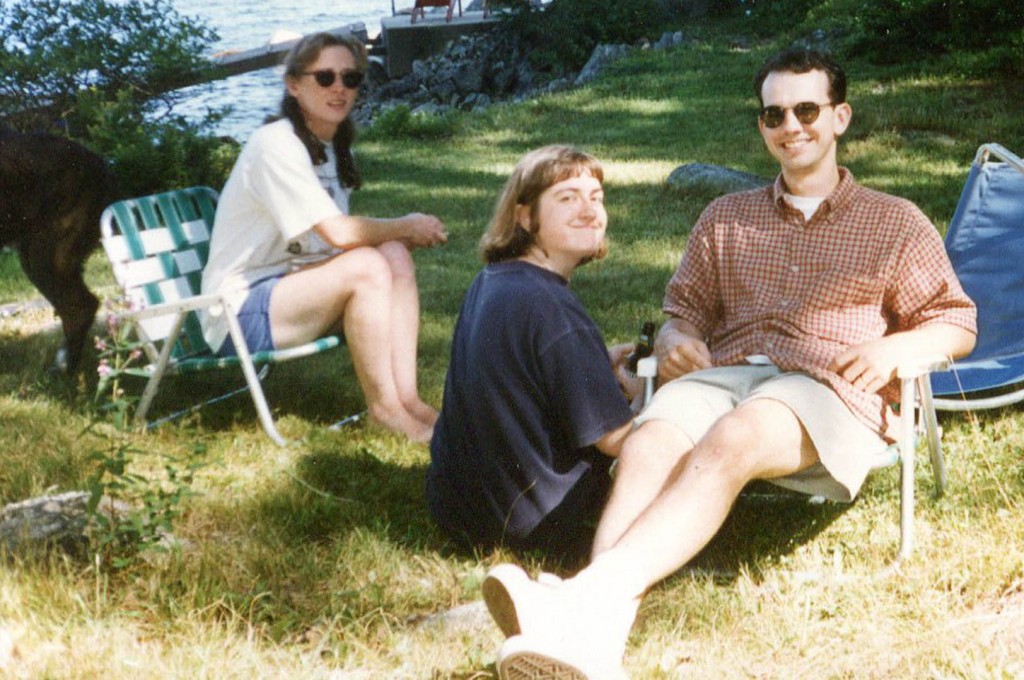
Nancy, at center, and Jonathan Nichols-Pethick at their farewell party in July 1996. At left is Louise Philbrick. Hubley Archives.
I see you standing on the other side.
I don’t know how the river got so wide.
— Leonard Cohen, “Tower of Song”
Hear fabulous Boarders tunes at Bandcamp! Why not humor the old man and buy the album?
Our farewell to drummer and good friend Jonathan Nichols-Pethick was extended and cordial.
Considering how sorry we were to watch Jon go, that was a jolly good show on the part of bassist Gretchen Schaefer and me, the other members of the Boarders.
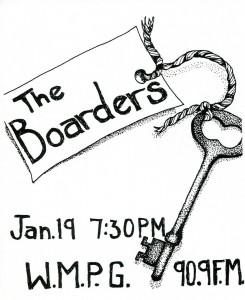
Bassist Gretchen Schaefer created this image to promote the band’s WMPG-FM performance in 1996. The key harks back to our marketing campaign in 1994.
The band, descended from a quintet called the Cowlix, had started out strong in 1994 and only gotten better. As previously noted in this space, we enjoyed a musical and personal synchromesh expressed as persuasively eclectic song lists and a quirky stage presence whose like
was seldom found in Portland.
We kept our standards high right through the bitter end. Final gigs included the highly unusual (for us) occasion of a live radio performance in January on “Local Motions,” a program dedicated to Portland-area musicians on WMPG-FM, the University of Southern Maine radio station.
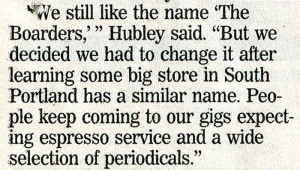
For his Press Herald column about the Boarders’ final concert, Ben Monaghan pulled this quote directly from my news release.
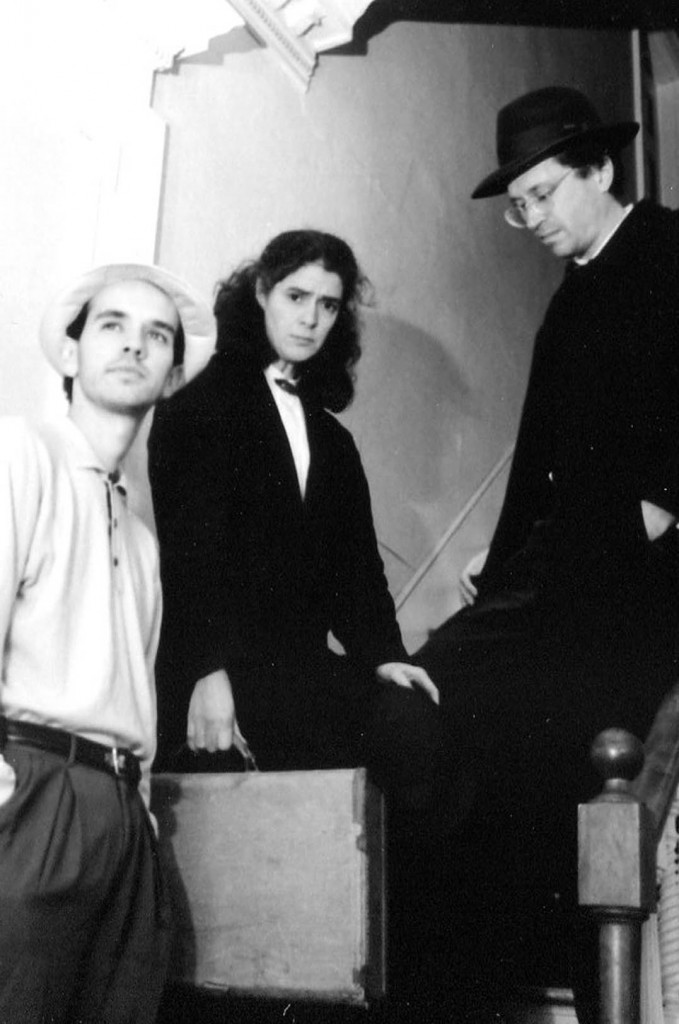
In this 1994 publicity image, the long faces were just a pose. Fifteen months later, we were wearing them for real. Photo by Jeff Stanton.
We returned to our spiritual home, the Free Street Taverna, for a couple of dates including our final performance, in July. Close to the end of that gig, accompanied by Gretchen’s bass and some poorly chosen sounds from my accordion, Jonathan played my Stratocaster and sang Woody Guthrie’s “So Long, It’s Been Good to Know You,” with some lyrics of his own. And that was that for the Boarders.
It was good to know Nancy and Jonathan, and happily we still do, though we don’t see them often. Eighteen years after the Boarders, they are still in Indiana, living in Terre Haute with their children, David and Trinity. Nancy has taught painting and drawing at Indiana State University since 2003. She devoted her sabbatical last fall to making an acclaimed series of paintings of the Wabash River.
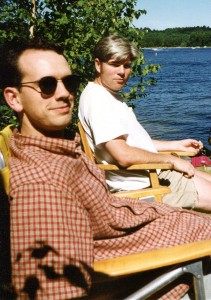
Jon Nichols-Pethick, left, at the July 1996 going-away party for him and Nancy Nichols-Pethick. At right, Scott “Diesel Doug” Link, whose band, the Long-Haul Truckers, used to perform the song “All Over,” which Jon (mostly) and I wrote. Hubley Archives.
Jonathan wrote a book about television police shows, TV Cops: The American Television Police Drama (Routledge, 2012). He teaches film and media at DePauw University and served as director of the Media Fellows Program and the Eugene S. Pulliam Center for Contemporary Media at DePauw.
Though our lives are now far apart and our connection derives from being in bands together long ago, it interests me to think about how we continue to relate to each other. Nancy and Gretchen are both visual artists, for example. And my day job at a small Maine college often involves publicizing faculty achievements like Jon’s new appointment or Nancy’s Wabash paintings.
It’s generational, right? They are about 10 years younger than Gretchen and I, so when the Boarders broke up they were doing only what we had done 10 years earlier: doing what they needed to do to get established in their careers. At the time of the Boarders, Gretchen and I were just settling into lives that, 20 years later, haven’t changed that much. But Jonathan and Nancy were preparing for takeoff.
One difference, though, involves intentionality. Gretchen and I had career dreams that glowed in the distance like Boston’s Citgo sign, but never took a straight path toward them.
We fumbled around for years until we finally found situations that seemed to work.
The Nichols-Pethicks, on the other hand, seemed to have their eyes on the longer-term goal ever since we knew them. They chose what they wanted, went for it and got it.
In a different way, maybe that’s generational too. Most of my contemporaries have career histories as haphazard as mine, but few of the younger people I meet do — and the younger the acquaintances, the more linear the resume.
So our drummer was gone. But during the ensuing months, Gretchen and I continued to make music. Thinking we might not have another drummer, we went acoustic and turned to country music and close harmonies — pretty much what we’re doing now as Day for Night.
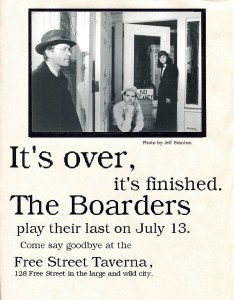 I have a vivid memory of us playing acoustic guitars in the living room and singing the Carter Family’s “Bury Me Beneath the Weeping Willow.” We worked on Leonard Cohen’s “The Bells” and Willie Nelson’s “Permanently Lonely,” among other songs, and we considered calling ourselves The Lagerhythms, a name I had wanted to use since the Cowlix days.
I have a vivid memory of us playing acoustic guitars in the living room and singing the Carter Family’s “Bury Me Beneath the Weeping Willow.” We worked on Leonard Cohen’s “The Bells” and Willie Nelson’s “Permanently Lonely,” among other songs, and we considered calling ourselves The Lagerhythms, a name I had wanted to use since the Cowlix days.
Hear the Boarders in rehearsal recordings, and one live performance, from 1995–96.
These five recordings from rehearsals, plus one from a live radio broadcast, capture The Boarders in the last six months of our time together.
- Shortwave Radio (Hubley) Leonard Cohen once told an interviewer something to the effect that performing “Bird on a Wire” reminded him of his duties. “Shortwave Radio” plays a similar role for me, albeit involving not duties as much as, simply, why I want to be in music, to the extent that I am. I started writing the lyrics in an art history class at USM in 1981, and finished the song up over a gin gimlet in my sister’s living room on a sunny summer evening, Bob Newhart on the TV, volume muted. This stayed in the repertoire for more than 20 years, from the Fashion Jungle to the Boarders to Howling Turbines. I can’t explain the doubled vocal in this late Boarders rehearsal recording. “Shortwave Radio” copyright © 1981 by Douglas L. Hubley.
- Slow Poison (Hubley) I wrote “Slow Poison” for the Cowlix in 1990, aiming for an Everly Brothers kind of thing that proved to be beyond my reach. But the song eventually made it into the ‘Lix setlist and thence to the Boarders’, whose energy suited it well. This song lives on in the Day for Night repertoire. “Slow Poison” copyright (C) 2010 by Douglas L. Hubley.
- Watching You Go (Hubley) Fate is generous with opportunities to dwell on the loss of loved ones, but it took the death of my cat Harry to get me to actually write about it. Fortunately I was able to generalize the lyrics somewhat beyond “my kitty died.” A rehearsal recording from July 9, 1996, just prior to the Boarders’ last gig. “Watching You Go” copyright © 1996 by Douglas L. Hubley.
- Dance (Hubley) This song started out in 1988 as a Fashion Jungle collaboration on a setting for my bleak lyrics. Six or seven years later, casting about for material for the Boarders and feeling no more optimistic about the fate of the world, I rediscovered the lyrics and created a new tune for them. A rehearsal recording from July 9, 1996, just prior to the Boarders’ last gig. This recording is a copy of a copy made on a mastering deck with a wow-and-flutter problem, hence the wow-and-flutter. “Dance” copyright © 2010 by Douglas L. Hubley.
- Looks Like My Monkey Got Loose (Hubley) I must admit that Jonathan’s impression of a chimp being forced to put on a sweater had a certain inspirational effect here. (You diligent DePauw students who track this down on Google: Live it up!) But I was sitting on a Metro bus in January 1996, waiting to leave Elm Street, when I thought of a crazy monkey as a metaphor for lack of self-control. (You may not believe it, but I myself have had impulse-control issues.) I had most of the lyrics done by the time I got home. My only recording of the Boarders playing this selection, this is a copy of a copy made on a defective cassette deck. Recorded in June 1996. We had to give up the Little Debbie Swiss Rolls once and for all after the news about transfats came out. “Looks Like My Monkey Got Loose” copyright © 2010 by Douglas L. Hubley.
- Watching You Go (Hubley) A selection from The Boarders’ performance on “Local Motives,” a showcase for Greater Portland bands, on the University of Southern Maine radio station, WMPG-FM. Thanks to an incompetent mix engineer, this is one of only a few usable recordings from the session. “Watching You Go” copyright © 1996 by Douglas L. Hubley.
Notes From a Basement text copyright © 2012–14 by Douglas L. Hubley. All rights reserved.
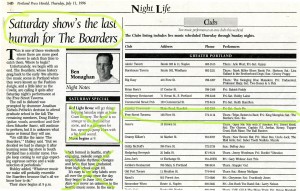
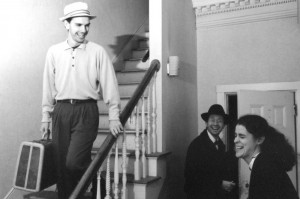
![Late in the 1860s novel Little Women, heroine Jo March, dreading her friend Laurie’s budding romantic feelings for her, tells her mother she feels “restless and anxious to be seeing, doing and learning more than I am.” Her solution is to move to the city, to live and work in a boardinghouse. There, she has a room to herself, time to write, and the welcome distraction of friendships with her fellow boarders. — Ruth Graham, The Boston Sunday Globe, Jan. 12, 2013 [Week of March 24] Boarders Let's begin with something deceptively obvious. Larger musical groups are empowered by their capacity for complexity. Smaller bands are empowered by the need to keep it simple. Obvious, for sure, but for the musicians involved, it's a powerful reality that encompasses infinite subtleties in both directions -- perhaps unexpectedly so in the case of the minimal. The richness of potential there can be highly gratifying. Every time I have gone from a larger to a smaller band, I've felt suddenly light, ready to fly. This was especially true in the case of the Boarders, the trio remaining after two musicians departed our so-called country band, the Cowlix. Singer Marcia Goldenberg left in March 1994 and violinist Melinda McCardell in May, after one last gig. My fellow remnants were Gretchen Schaefer, who played bass and guitar, and drummer Jonathan Nichols-Pethick. I played guitar and accordion, proposed much of the material and sang most of it. Post-Cowlix, we wasted little time finding a direction. And circularly enough, our direction was to be the Boarders. Atop a hard core of held-over Cowlix country and folk-dance repertoire, we added pop-rock by Buddy Holly, Jackson Browne and others. I was gratified to bring in two songs by Tim Hardin, one of my first big influences, to the repertoire. We learned two by the Kinks; the Oysterband's brilliant "When I'm Up"; Anne Savoy's adaptation of the Cajun song "Mon Chere Bebe Creole." From the torch song catalog came "What's New" and "I'll Be Seeing You." We glommed up enough Leonard Cohen to jokingly bill ourselves as Portland's only L.C. tribute band, even tackling the French Resistance anthem "The Partisan," which Lennie covered on his second album. And we revived several originals by my pre-Cowlix combo, the loudly romantic Fashion Jungle. Speaking of which, among other improvements that came with the Boarders, it was here that I felt at home as a songwriter again after five years adrift. It was ironic, or at least telling, that toward the end of the 'Lix I was thinking about revisiting Fashion Jungle material (and we even picked up "Shortwave Radio"). Apparently I am on a short chain fastened to a post in the ground, because I walk in one direction until the chain is wrapped completely around and then I wind it again the other way. In the four years of the Cowlix, I wrote two songs: "Slow Poison" and "Trouble Train." In the two years of the Boarders, I wrote three, including two that I consider among my best, "1,000 Pounds of Rain" and "Watching You Go." And for the first time since the Fashion Jungle, I wasn't the only songwriter in the band. We hung onto Jonathan's "All Over," and he and his wife, Nancy Nichols-Pethick later presented "Tragedy." Nostalgia wears rose-colored contact lenses, but it seems to me that our musical interests were as harmonious as everything else about the Boarders. I don't recall Gretchen, Jonathan and me ever discussing our repertoire in broad or aspirational terms, and neither did we disagree about material. We just brought songs in and, for the most part, played them. It was a relief to lose the country music fiction espoused by the Cowlix, a band with a long stylistic reach and a grasp that almost matched. As previously noted, I, at least, had started violating the "country" descriptor early on. And now here were the Boarders with no such mandate to obey or defy. Like the Cowlix, we had the range to pull off a variety of music, but there was a crucial difference: What the 'Lix lacked and the Boarders possessed was a collective personality focused enough to forge an identifiable sound from some disparate types of music. Much of that personality was purely musical and organic, but -- and I know it will shock and surprise you that such things happen in the music biz -- some slight contrivance went into the Boarders' public identity. The three of us had zero interest in retaining the Cowlix name. Not only did we wish to leave the past in the past (as I am obviously so dedicated to doing), but we had discovered along the way that we weren't the only ones using that name. Pretty obvious moniker for a country band, after all. I don't recall where or how "Boarders" turned up, but it seemed sufficiently random-yet-meaningful, that irresistible combination, to work for this "new" band that seemed capable of anything. The richness of the Boarders' prospects and potential, coupled with my decade-plus experience, as a music journalist, with musicians angling for my attention, prompted a fairly focused publicity campaign. We even created press kits, including a band history (remarkably free of factual content), demo tapes, a sample lyric ("Trouble Train"), publicity photos by longtime friend Jeff Stanton -- and a key pin. Key pin? Just like it sounded: an old-fashioned lever-lock key with a pin-back epoxied onto it, so it could be worn as a pin. The key concept was derived from the boardinghouse concept, and the whole works was derived from my realization that journalists and club owners would be more likely to remember a band that gave them presents. Who doesn't like presents? I have no idea whether the key pins made any difference to our getting work -- although we did get work. But, revisiting the two key pins that I still have from that exciting Boarders efflorescence 20 years ago, I would like to think there are still a few Boarders key pins turning up, from time to time, on the sport jacket lapels and cloche hats of Portland's hip-and-cool.](https://www.dhubley.com/wp-content/uploads/2014/03/Boarders-JS-LEDE-1024x680.jpg)